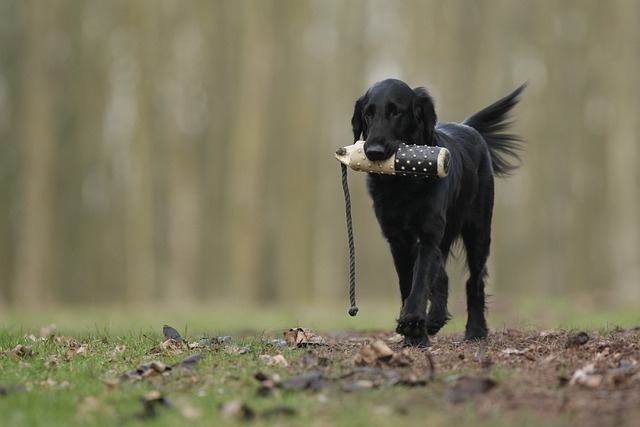In some ways a dog is similar to a remote that needs programming to work with your television. The animal and the device are fully capable of producing the desired results, yet something more is needed to take advantage of those functions. The potential is already within your dog, you just have to use the tips below to bring it out.
Reinforce calm behavior upon your arrival. Playtime is great but sometimes it is just not appropriate. When you enter the room, ignore excessive agitation on your dog’s part. By ignoring the behavior, you will extinguish it.
Consistency is critical for crate training to succeed. Whenever you let your puppy out of the crate, he must be given the immediate chance to go potty. Eventually, your dog will wait until you let him out of his crate to relive himself.
Do not tie a couple of dogs closely together. The two chains could get tangled up. This could panic you dogs as he tries to get free and he could potentially hurt himself. In the case that a large dog and small dog become entangled, the large dog’s rope or chain could cut off air circulation to the small dog, and it could be severely injured or die.
Repetition is what causes a dog to learn. It isn’t uncommon for 25-50 repetitions of this same command to be used for the dog to understand it. Keep working patiently on the command- he’ll get it with time.
Whenever you want your dog to complete a task, you must reward it. It is important for the dog to realize when he exhibits the proper behavior in response to your commands. This is a good way to make your dog know the difference between a good and bad thing.
Dog’s deserve more freedom as their training progresses. The balance between freedom and obedience will give your dog a satisfying life. Be cautious on not giving your dog too much freedom right away, because this could have a bad effect when it comes to your dog’s training.
Avoid accidents when potty training your dog. Learn the signs that your dog needs to use the restroom. Pacing, snuffing and whining are common. Don’t put it off when your dog is doing these things. Grab a leash and take your dog to a designated spot in your yard. Whenever he relieves himself in an appropriate time and place, he should be praised immediately. Soon, he’ll get the picture that he can ask to go outside.
If your dog wants to jump you should squeeze their paws when they do so, they will know that they shouldn’t do that. While this will not seriously hurt the animal, it is certainly unpleasant and therefore makes a powerful statement. After a while, they’ll stop jumping due to this uncomfortable feeling.
To make sure your dog’s behavior stays good, you should continue training him throughout its life. You should not stop training your dog at the end of their puppy stage. If you provide positive reinforcement for desirable behaviors, your dog will continue to be obedient, and when you provide your dog with consistent discipline, negative behaviors are less likely to occur.
Dog barking can be stopped by removing the cause. It might be something they hear or being exposed to people. The dog must learn that they do not need to start barking when these things occur.
Pay attention to your tone when you are disciplining your dog. Dogs are very empathic to their trainer’s emotions. It is okay to be appropriately stern.
Train a puppy to accept a leash by playing with the puppy while it wears its collar. Getting your puppy used to the collar is essential for proper use of the leash and for ensuring that his ID tags are worn just in case he runs off.

It may be difficult, but you should always exercise patience around your dog. Your dog doesn’t understand your language and is not a human being. He will pick up on gestures and tones you give off rather than what you are actually saying. If you or your dog seem frustrated, it’s time for a break.
Always avoid offering your pet a reward for bad behavior in the hopes of snuffing out an undesirable action or tendency. The dog will only learn that it is the boss. Do not ever reward bad beahvior.
Keep your dog challenged regularly. Test the dog occasionally to check his memory, even though both of you know that he remembers his commands.
Do not quit when you are training your dog. If your dog doesn’t get reinforcement for his current level of training, he’s likely to slide back into how he acted before he was trained. You always need to keep training your dog, just like you need to continue feeding it and providing it shelter.
Is your dog a leash puller? This is one of the most common complaints owners have about their dogs, and it’s also incredibly easy to remedy. A harness can make walking your dog a more enjoyable experience. It can also reduce the amount of pulling your dog does.
One of the first commands your dog should learn is “down.” It can be very useful during emergencies and also serves as a great foundation for future lessons. A dog that knows his “down” command well can drop to the ground at a moment’s notice in a testy situation, making it a great command to keep on hand for safety’s sake.
You should use the name of your dog as a positive reinforcement more often than you use it as a reprimand. Your canine friend needs to know that his name is a good thing, as he should always feel safe coming to you when his name is called out.
It’s important that your dog enjoy training and look forward to training sessions. Keep the sessions limited to 15 minutes or so to avoid the dog becoming disinterested and distracted. The rewards offered to your dog need to be plentiful (especially at first) and varied. Make sure to praise your dog when he does something right. If you make training fun, he will enjoy listening, too.
When teaching a dog to sit, start by holding a treat above him while he stands. As you allow the treat to move into his field of vision, your hand will slowly pass behind him. This will shift their eyes up during the process. He’ll sit as a result.
It is important to work on the recall of your dog. He should always come when called. Build this important behavior in parts, in order for your dog to learn to obey regardless of distractions. You might just save your canine’s life some day because of recall, so never skip or pass on training this, regardless of what it takes to get it done.
An older dog can learn new things, but you need to be aware of health issues that might cause his ability to be somewhat limited with certain things. For example, if your dog has arthritis, asking him to crawl long distances may not be very practical. Older dogs often find mental stimulation in training, keeping them young at heart. However, you should make sure these sessions are not causing any pain.
Now that you have a few strategies for training your dog, it’s all about properly applying them. Dogs love to make their owners happy, so training them is actually enjoyable for them as well.
Do not take out your other frustrations on your dog by speaking to it sternly for no reason. Always use a positive tone of voice with your dog unless they have done something wrong.
20% off Sales Specials with Promo Code!
